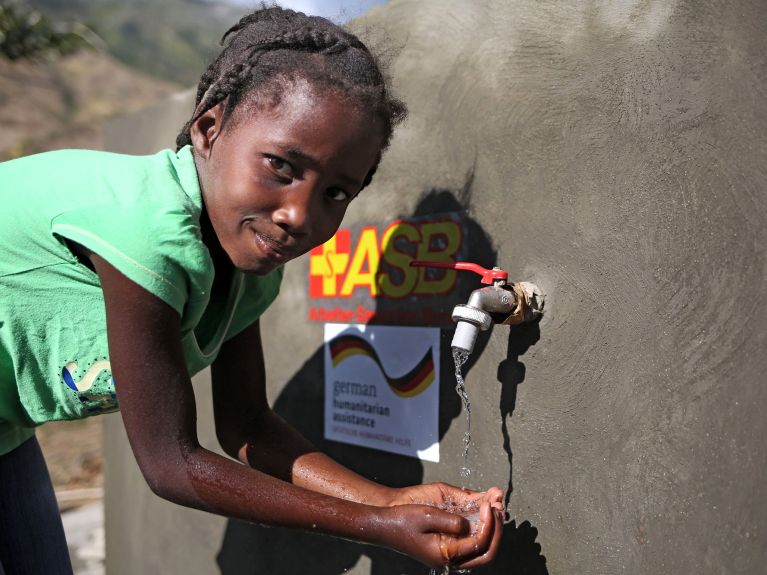Fundamental principles of humanitarian aid
What is humanitarian aid? How does the Federal Foreign Office provide assistance? On which principles is German aid based?

Humanitarian assistance is designed to help people at risk or already in dire need as a result of natural disasters, epidemics or conflict. It can be categorised according to five different fields of activity:
- Immediate emergency aid is designed to save lives and alleviate acute suffering in the immediate wake of sudden disasters. One example is helping to search for and rescue victims following severe earthquakes.
- Ongoing emergency aid is provided in more protracted crisis situations, where there is no sign of short‑term improvement. Ongoing emergency aid measures include provision of drinking water supplies and emergency shelters.
- Transitional humanitarian aid is granted over the medium term and constitutes the link between short‑term emergency measures and long‑term development cooperation, for example through rehabilitation measures, so that people in need do not fall back into life‑threatening circumstances.
- Disaster reduction measures with the goal of preparedness are designed to reduce the impact of future crises before they happen. They include, for example, work on early‑warning mechanisms and training of humanitarian aid workers on the ground.
- Humanitarian mine and ordnance clearance also falls into the category of humanitarian assistance. The removal of anti‑personnel mines and unexploded ordnance, as well as victim assistance, helps save lives and reduce suffering.
What does the Federal Foreign Office do?
Within the German Government, responsibility for humanitarian assistance lies with the Federal Foreign Office. Through its Crisis Response Centre at the Head Office in Berlin, it can be contacted round the clock and can get relief measures underway within hours. Its network of missions abroad plays a crucial role in early warning and quickly establishing contact with those affected and relief organisations on the ground. Bärbel Kofler has been the Federal Government Commissioner for Human Rights Policy and Humanitarian Aid since 1 March 2016. She is the central point of contact for humanitarian aid issues at the Federal Foreign Office and maintains contact with the relevant partner institutions in this area.
The internationally recognised concept Linking Relief, Rehabilitation and Development“ (LRRD) envisages dovetailing humanitarian assistance measures with long‑term development cooperation, which in Germany is the responsibility of the Federal Ministry for Economic Cooperation and Development.
For 2017, approx. 1.2 billion euros have been earmarked in the German budget which the federal Foreign Office can use to fund humanitarian assistance projects throughout the world. The Federal Foreign Office is cooperating with numerous partners in this sphere. These include the humanitarian organisations of the United Nations, the International Red Cross and Red Crescent Movement, and German humanitarian NGOs.
Guidelines for humanitarian assistance
Humanitarian assistance is often undertaken in a difficult political environment with poor security, and usually under considerable time pressure. It is therefore vital that the work follows certain guidelines and organisational principles:
- The principle of humanity dictates that human suffering must be relieved wherever possible and special attention given to the population groups most at risk.
- The principle of neutrality forbids the preferential treatment of particular sides in conflict situations. The perception of aid organisations as neutral entities is crucial for the safety of the aid workers.
- The principle of impartiality dictates that assistance must be offered solely according to need. It must not discriminate between population groups or on the basis of age, gender or religion.
- The principle of independence draws a line between humanitarian goals on the one hand and political, military, economic and other goals on the other. The sole legitimate purpose of humanitarian assistance is to relieve suffering.
- Humanitarian assistance is tailored to the needs of the people. That means that aid recipients are selected according to objective criteria. The Federal Foreign Office cooperates with the United Nations and partners on the ground to assess requirements more effectively.
- The government of the affected state bears chief responsibility for protecting its population in accordance with the principle of subsidiarity. International assistance only comes to the fore if the government is unable or unwilling to perform this task adequately.
- According to the "do no harm" principle, undesirable negative consequences of humanitarian aid – for example, for the environment or gender equality – should be avoided. Protection measures, for example in the case of sexual violence and human trafficking, are also a key component of humanitarian aid.